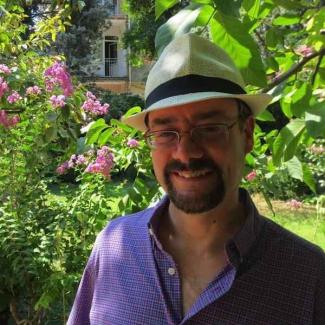In 2023 the Department of Middle Eastern Studies inaugurates the Franklin Lewis Lecture Series in Persian Literature. This series is made possible by a generous gift to MES and the Humanities Division and will support two lectures per year on Persian literature to honor the legacy of the late MES Professor, Franklin Lewis.

ABOUT
Professor Franklin Lewis began his study of Persian and Persian literature at the University of California at Berkeley (B.A., 1983) before joining the Ph.D. program at the University of Chicago. He completed his dissertation, “Reading, Writing, and Recitation: Sanā’i and the Origins of the Persian Ghazal” in 1995, still one of the most widely cited dissertations in Persian literary studies. After serving two years as a lecturer in Persian at Chicago, Professor Lewis joined the faculty of Emory University in 1997 before returning to his alma mater in 2005. He taught courses spanning the entire history of Persian literature and served as the chair of the Department of Near Eastern Languages and Civilizations at the University of Chicago from 2015-18 and 2019-22.
Professor Lewis was a prolific and dedicated scholar. His landmark book, Rumi: Past and Present, East and West. The Life and Teachings of Jalāl al-Din Rumi (2008), reassesses all previous research on the life of Persian’s foremost Sufi poet and skillfully navigates the complex history of the poet’s later reception around the world. The book will serve as a touchstone for any future research on Rumi and has been translated into Persian, Arabic, Turkish, and Danish. Frank’s work, however, went beyond the mystical poets, and his many journal articles and contributions to collected volumes (in both English and Persian) offer insights into other major figures of the classical tradition, such as Ferdowsi, Sa‘di, and Hāfez. Frank was also a skilled translator of both classical poetry and modern poetry and fiction. Particularly noteworthy are his remarkable translations of selected ghazals by Rumi (Swallowing the Sun, 2008) and Zoya Pirzad’s novel Things We Left Unsaid (2012). Whether as a scholar or translator, Frank’s work stands out for its philological exactitude, sensitivity to nuance, clarity of thought, and critical insight.
Professor Lewis’s dedication to Persian studies is evident not only in his publications, but in his untiring service to the field. In addition to his long service as departmental chair, Professor Lewis served as the president of the American Institute of Iranian Studies for fourteen years (2002-12, 2016-20), where he worked diligently to preserve and expand Iranian studies in the United States in wake of the 1979 Iranian Revolution. He founded and managed the list server Adabiyat, which has provided an international forum for scholars of Middle Eastern literatures for more than two decades. He has edited several collections of scholarly articles, translations, and special journal issues, most recently an issue of Iranian Studies devoted to the Shāhnāmeh as World Literature (2015). Perhaps his greatest contribution to the future of Persian literary studies has been his mentorship during his time at Chicago of a new generation of scholars. The students he nurtured with firm kindness will keep his legacy alive for decades to come.
Excerpt from the Memorial Statement for Franklin Lewis written by Paul Losensky (PhD UChicago [NELC],1993), Professor of Comparative Literature, Central Eurasian Studies, Hamilton Lugar School, Indiana University
